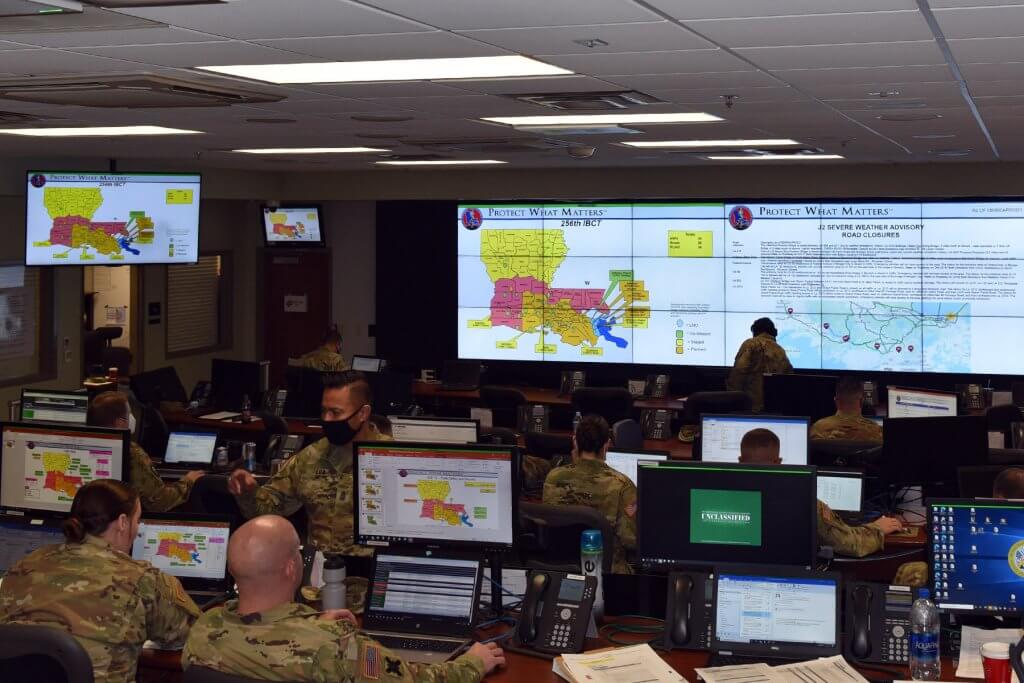As the country heads into storm season, states along the Atlantic and Gulf coasts are preparing for the June to November hurricane threats.
Updated averages for the 2021 Atlantic hurricane season have increased with a projected 14 named storms plus seven hurricanes, according to the National Oceanic and Atmospheric Administration (NOAA). So, to plan accordingly seems like a given.
North Carolina, hardly a stranger to adverse weather events, has already begun its preparedness.
“We, in North Carolina, are a little better off because one of our major force providers, was deployed last year, and this year they’re here,” Maj. Aaron Youngblood said. “So, we have more military capabilities to provide, but it doesn’t necessarily change ‘the how’ we’re doing it.”
Youngblood is the chief of domestic operations for the North Carolina National Guard.
The Guard’s relationship with North Carolina Emergency Management, or NC Emergency Management, is strong. But in the past, the Guard’s role was more reactive than proactive. NC Emergency Management called the Guard when needed, Youngblood said. Now they’re fully integrated into the platoon process throughout the year.
“The biggest thing is really kind of on two fronts,” Youngblood said. “For us, in the Guard, our experience of hurricanes in North Carolina just continues to grow … they’re getting bigger and were becoming more of a force provider than we ever have, and I think what we’ve learned is that when we’re integrated early, we’re better.”
In Florida — arguably the state with the most hurricane activity — each year’s preparedness game plan is influenced by the year prior.
“Unfortunately, we get plenty of real-world training here in the state of Florida when it comes to the storm response,” said Capt. Justin Phillips, the operations branch chief for the Florida National Guard’s Director of Military Support. “And with each response, we do extensive after-action reviews to ensure that we capitalize on lessons learned in order to continuously improve our response efforts.”
Phillips said search and rescue requests are generally the first mission sets the Guard receives.
The Florida National Guard will be conducting internal hurricane exercises this month.
A little to the west along the Gulf Coast, the Louisiana National Guard recently engaged in an annual Disaster Response Exercise (DRX) with other agencies. The exercise was structured to test and strengthen the capacity and joint action between various state government entities. It allows agencies to seek ways of improving from past errors.
“We are constantly improving, and constantly trying to learn from our mistakes,” said Cpl. Brandon Fontenot of the Louisiana Department of Wildlife and Fisheries in an April of 2021 press release issued by the Louisiana National Guard. “Every search and rescue mission is going to be different.”
“During this simulation, guardsmen are tested on their ability to respond to a category four hurricane,” commented Louisiana National Guard 1st Sgt. April Davis, the J2 Intelligence Office senior enlisted advisor, in the same press release.
And if a hurricane isn’t enough, just layer it with a pervasive virus.
The North Carolina Guard has now had a year of dealing with COVID-19. It significantly impacts how the Guard operates and approaches situations, Youngblood said.
“Obviously, we understand it a little better. So, we’re better prepared,” he said. “We have the adequate equipment, and we’re ready to go out there and support and mitigate that threat while still doing our hurricane stuff.”
The Florida National Guard has initiated two hurricane event missions during the pandemic, after receiving requests from the Florida Department of Emergency Management.
“We definitely studied how we responded last year … the safety of our soldiers and airmen is paramount as we respond to the citizens of Florida,” Phillips said. “So, we just took all precautions needed.”

